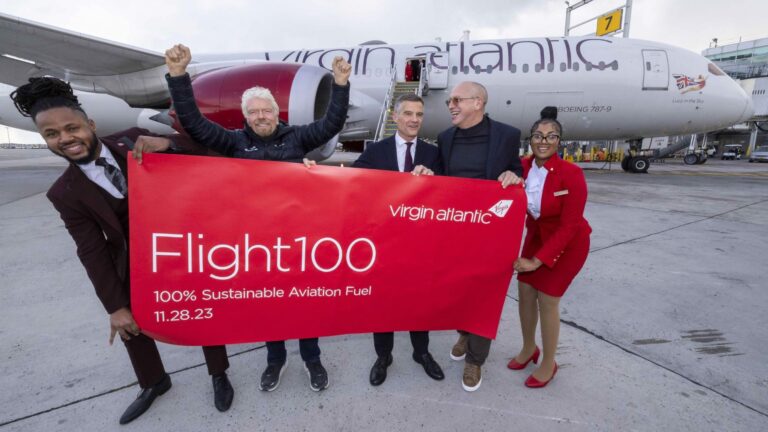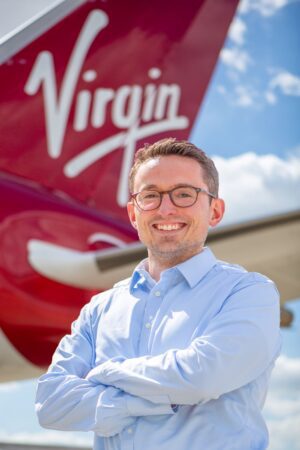
It was the first time 100% SAF has been used to fuel both engines of a commercial airline across the Atlantic as Flight100 made its journey from London Heathrow to New York JFK.

The purpose of the flight was to demonstrate the potential of SAF as a 100% drop-in replacement for fossil fuels, to provide important research on the end-to-end carbon life cycle of SAF, and to act as a call for the support of greater production and use of SAF at scale.
Claudia weeks, Community Content Lead for Fuel Oil News, spoke with Ian Mcdonald, Head of Fleet Technical Management at Virgin Atlantic, about Flight100 and the future for sustainable aviation.
What is your role at Virgin Atlantic and what is a typical day is like for you?
I am the Head of Fleet Technical for Virgin, I am fortunate to lead a team of 50 fantastic engineers that manage the safety and reliability of our fleet. My team and I collaborate closely with the key suppliers like Boeing, Airbus and Rolls-Royce, making sure that our fleet have all the latest parts and modifications required.
My team is quite small, but the remit is broad. We cover everything from propulsion to avionic systems and have a reliability team that looks for ways in which we can continually improve fleet reliability. Getting customers away on time is what matters and, the higher the reliability, the more we can make sure everyone is off on time!
Day to day, we have lots of operational calls, which happen first thing in the morning, to see how the fleet was over night – it’s a global, 24/7 operation. I also have meetings throughout the day – these might be with staff committees, or meetings with my managers about their teams – it’s a good mix of working operationally and with people.
Congratulations on Flight100 – the first 100% SAF flight by a commercial airline across the Atlantic! What has the response been like to the flight?
We entered a competition with the Department for Transport (DfT) to complete a 100% SAF flight across the Atlantic, and we were delighted to win.
Our objective was simple when we entered the competition; we wanted to raise the profile of SAF and to prove that it was technically possible to run a flight powered by 100% SAF.
We saw an incredible response in the press both in the UK and globally. There was a helicopter charted by Sky to follow the take-off of Flight100, and to see us live on Sky News while we were on the plane was fantastic. The flight was also covered hugely in the news in the USA.
Sir Richard Branson was on board, as well as Mark Harper, the Government Transport Secretary and senior representatives from the consortium that really demonstrated the industry coming together in support of the flight. To have such high-profile individuals conducting interviews on board really helped further the conversation around SAF and the future of aviation.
Please tell us about the day of the flight.
It was an honour to be a passenger on the first 100% SAF flight.
We operated the flight under a permit to fly which was through the Civil Aviation Authority as the fuel isn’t yet an approved drop-in fuel (although it is in the process of being approved).
Under a permit flight, you are not permitted to have any revenue customers on board, as we weren’t operating under our own certificate, but we felt it was important for us to have observers of the first 100% SAF flight. It would be counter-intuitive to have no one on board to witness the success of SAF; we wanted people to communicate the success of the project.
We had around 100 people on board for the flight. On the day, there was such a buzz and atmosphere as we had spent 12 months preparing for the flight, testing, validating and even running a dress rehearsal flight! We were very calm and confident – by that point, it was a celebration.
We had three pilots on board; Captain John Walker had been selected from the beginning as he has always been passionate about sustainability and championing the viability of SAF.
We had a mix of government officials, press and some of the technical collaborators on board. It was a wonderful chance to meet some of the collaborators in person. We had done a lot of the work remotely and so it was great to finally talk in person and on such a momentous occasion.
Everyone was free to mingle on board (when it was safe to do so!) and interviews and conversations were conducted around the airplane. The flight went incredibly quickly.
Holly Branson was also on board supporting our PR and Communications team. She was a roving reporter and conducted lots of interviews and promoted the flight online.
Richard Branson was speaking as we landed, and there was a huge round of applause as you would expect!
Flight100 was made possible through collaboration between a Virgin Atlantic- led consortium, including Boeing, Rolls-Royce, Imperial College London, University of Sheffield, ICF and Rocky Mountain Institute, in partnership with the Department for Transport.
Will you continue to work with these partners to focus on future sustainable flights?
We are doing an industry ‘Share Out’ with our collaborators which involves us pulling together lots of reports from different institutes and our own technical team about the complete carbon footprint for the flight.
We want to demonstrate, and prove, the 70% reduction in emissions. We are hoping to share this information and make it public by May.
We are also working with our key partners – Air France and KLM. We want to share our knowledge, learning and expertise with other airlines that are interested.
We know that, technically, it is possible to fly using SAF and, if the industry can produce enough, then we will fly with it! We want to fly 100% as soon as we can but it all hinges on production.
Mark Harper was clear that the Government are looking to invest in production and want to deliver six UK-based SAF plants. SAF needs to be a homegrown product since importing SAF won’t make it a sustainable option. It is a hard challenge, but we are happy to share our learning and want to see progress across the industry.
Flight100 was supported by the UK Government. Is Virgin Atlantic involved with influencing legislative changes or lobbying government regarding future laws and requirements for aviation fuel?
Working in collaboration with the Government on this project means that we have worked closely with them throughout. The DfT has been with us all the way – from winning the competition, through funding the process and offering advice and support. Mark Harper was integral to promoting the flight and championing the use of SAF within the industry.
We work with the ASTM through our suppliers who review all the fuel standards. They have given guidance around appropriate fuel usage and specification. Rolls Royce and Boeing have played a huge part in all of this.
What are your thoughts on feedstocks for SAF/biofuel? How can businesses ensure that the provenance is truthful and not creating other environmental issues such as deforestation, use of food crops, changing land use, etc.?
Sustainable Aviation issued a report in 2023, demonstrating that there is sufficient feedstock to produce enough SAF for the Government target of 10% in 2030 as well as the expected UK aviation demand for SAF in line with a net zero 2050 trajectory, without competing with crop production or impacting the natural environment.
Biofuels are the primary opportunity in the short term and, in the longer term, will represent over 30% SAF volume.
The primary feedstocks for UK SAF projects are municipal waste and waste biomass, which use no farmland.
Is SAF is the future for aviation? Are there are viable alternatives?
SAF alone will not decarbonise aviation, but as zero emissions electric and hydrogen aircraft technologies are decades away for long-haul aviation, SAF is an immediate mid-term solution.
What is your opinion on ‘greenwashing’? (Environmental campaigners have accused airlines of greenwashing and dispute the benefits of SAF and say that only a reduction in the number of flights will significantly reduce the harm caused by aviation.)
Greenwashing can be an issue with businesses. The focus on sustainability is huge and businesses are under enormous pressure to prove their green credentials.
I don’t believe the solution to making aviation green is to ban flying. The social and economic impact of Covid was devastating and demonstrated that people need to fly. People rely on us to be connected, whether that’s with family or in business so we need to make flying as sustainable as possible.
Not flying is not an option.
At Virgin Atlantic we are proud of the steps we are taking towards sustainability. We are agile as an airline due to the size of our business. The average age of our fleet is around six years old which is important as the newer aircraft are much more fuel efficient.
We are very proud as an airline to have new aircraft, to have supported Flight100 and be working towards 2050 and our commitment to milestones along the way.
What will make the difference to mass adoption of biofuels?
Currently, the cost of SAF is significant and that is a barrier to mass adoption for air travel. If we can increase production, then the cost will reduce – it’s a simple issue of supply and demand. Virgin has always said that, if you can produce it, then we will fly it!
There are enough companies, especially in aviation, that want to spend time, focus and money on SAF. The appetite is there. We need the availability and I do believe this will change over the next few years. It will be interesting to track the plans for the six new SAF facilities – they should be of the scale required so we need to see how long it will take for them to start producing in high volumes.
Over the next few years, what do you see as major challenges to the aviation industry and what are the positives?
We know that the aviation sector is one of the hardest to abate when it comes to sustainability and the emissions reduction required. As we have spoken about, it is our challenge as an industry to keep the world connected but finding the most sustainable ways to do it.
In terms of positives, we have proven with Flight 100 that there is a sustainable solution in the use of SAF that doesn’t require any modifications to existing Engine and Airframe technologies.
As an industry the challenge now is to build on the collaborations that have already started and focus on the right level of investment to achieve the production of SAF on the required scale and at pace.
Virgin Atlantic prides itself on pioneering sustainable solutions and is committed to net zero by 2050. Apart from SAF, what else is Virgin Atlantic investing in to reduce carbon emissions?
There are two levers for in-sector carbon reductions in the short to medium term: fleet we operate and fuel we burn.
We already operate one of the youngest and most efficient fleets across the Atlantic and, in the last decade, we have reduced our absolute carbon emissions by 35% – driven by our fleet transformation.
SAF is the most readily available decarbonisation lever to aviation today and represents real emissions reductions of the life cycle of fuels compared to fossil jet fuel. While Flight100 focussed on SAF, we also trialled efficiency measures to reduce emissions, investing in UK biochar removals to address residual emissions and collating data on the impact SAF can have on contrail formation.
Other technologies such as zero emissions electric and hydrogen aircraft are not feasible technologies for long-haul aviation in the time frame to 2050. We are, rightly, focused on the levers we have to reduce in-sector emissions – the fleet we fly and the fuel we burn.
What are the future ambitions for Virgin Atlantic?
We know that we aren’t the biggest airline, but we pride ourselves on being one of the best at customer service. We offer a premium, leisure- based, customer offering. People will fly Virgin because they love the customer experience – it’s not just flying from A-B, we want to offer an experience in travel.
Other airlines are struggling to offer the same levels of customer service, so we want to continue building our customer service reputation. We are on a journey to be the most- loved travel company.
We now want to link sustainability with that customer travel experience. People have high expectations from businesses, they want to know that they are investing in sustainable practises and that they care about the future of the planet. Our customers know that we care.
What do you enjoy most about operating in aviation?
I have to say the variety in aviation – no two days are ever the same. As we are a relatively small and agile airline it means that every day is busy and varied. It’s exciting!
On a personal level, I’ve always been passionate about aviation. Planes and travel have always fascinated me and it’s a pleasure working for Virgin Atlantic.
Image Credit: Virgin Atlantic
